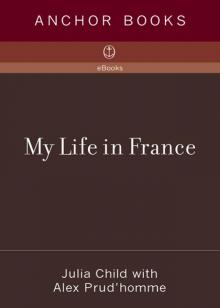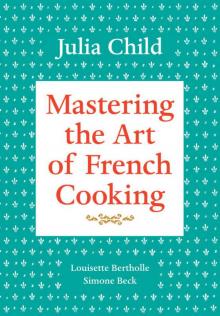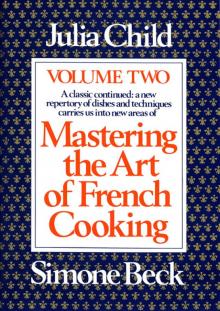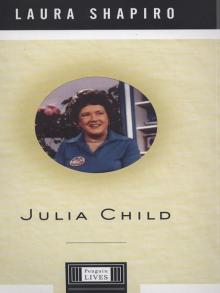- Home
- Julia Child
My Life in France Page 17
My Life in France Read online
Page 17
On Easter Sunday, Cohn and Schine said, they wanted to interview our Ambassador Draper and the top USIS officers about the books in the embassy library. Everyone canceled their Easter plans. Lo and behold, on Sunday neither Cohn nor Schine appeared. Finally, at four-thirty in the afternoon, they were located in their suite at the Hôtel de Crillon (paid for, no doubt, by American taxpayers) eating breakfast! The young geniuses granted the ambassador fifteen minutes, and the senior USIS staff ten minutes each, and spent most of the time eating scrambled eggs and discussing whether they should go to London or Vienna next. Finally, they flew off to Bonn without alerting anybody there that they were coming. The insolence of this “investigation,” and unfair charges about what they’d “found,” was enraging.
“As nearly as I can make out, the only ‘research’ they did was during most of Holy Saturday night among the naked showgirls of Montmartre,” Paul snapped.
But there was no mistaking the fear these young thugs had sown in the diplomatic corps. This prompted us to have the “What If” conversation again: if Paul were to lose his job, then what would we do? We’d quit government and set ourselves up in the world of cookery-bookery-teachery, we decided. It would be so much more congenial.
V. MISTRAL
WHOOOOSH! As we detrained in Marseille, we were almost swept off our feet by a piercingly cold, dusty, savage wind that howled out of Siberia, across the Alps, along the Rhône Valley and down our necks. Boxes, barrels, crates, garbage, and newspapers sailed through the air and banged up against houses. The incessant wind tore away roof tiles, blew down chimneys, and ripped shutters off their hinges. The sea in the Old Port was sloshing and foaming, as hundred-foot-high walls of spume writhed across the harbor. Boats were huddled together like sheep; the masts of the fishing fleet leaned way over, and the rigging moaned like a train whistle. Paul and I had to squint and hunch our shoulders against the blast, and we barely made our way along the quay. When we finally reached home, we found that the windows of our apartment, six floors above the street, were completely frosted over with salt from the sea spray.
This was our first true mistral, the notorious windstorm, and it was so exhilarating it was hard to think straight. It was as if we were under bombardment.
The next day there was no wind at all. It was unbelievable. Our necks and ears were still black from the sideways-flying dirt. At the end of the harbor, guys with big rakes skimmed the water to clear away great mounds of seaweed, planks, oranges, and other flotsam piled up there. We kept bracing ourselves for a new onslaught—the way, after a picnic full of ants, you feel them crawling up your leg even when they aren’t there.
IN MID-APRIL, Paul was named one of the consulate’s delegates to the Cannes Film Festival. When we went for the opening, we arranged to stay with Simca at her mother’s house, a villa called La Brise, in Mandelieu, in the foothills about five miles outside of Cannes. Like her daughter, Madame Beck was tall, with pale Norman skin, and a stern face. The two of them were energetic, kind, extremely verbal, opinionated, and generous. They talked twice as fast and twice as loud as most American women did, which I didn’t mind but which wore Paul out.
La Brise was large and rambling and stuffed with little bibelots. Sitting in the window of our bedroom, thrown wide open to the delicious cold air, stood a bottle of Air Wick with the wick pulled all the way up. I was surprised, as I considered Air Wick a typically American consumer product. And so our first evening in that wonderful old French villa began with the sound of spring’s peeping frogs and the inescapable odor of Air Wick.
Paul didn’t really give a hoot about the glitter surrounding the film festival, but as an official representative of the U.S. government he was required to show his face at the big functions. The faces that counted along the Croisette, of course, were the movie stars’. There were clumps of them from France, Spain, Brazil, Mexico, Sweden, Finland, and Hollywood. While Simca and I stayed at La Brise to work on The Book, Paul sipped champagne in the sun on a hotel terrace and watched them drift by: Olivia de Havilland (she had a beautiful, open, “real” face, he noted), Lana Turner (a carefully composed, totally artificial façade), Edward G. Robinson (a Little Caesar type), the latest Tarzan (tall, thick neck, wavy dark hair, a blank Narcissus face), and Jean Cocteau (elderly, distinguished, ravaged, and dressed in a fringed wool shawl and sky-blue pants).
In the evening, Simca and I joined Paul and fifteen hundred other people for a cocktail party, followed by dinner with a large consulate group, and then to see two U.S. films—a Disney documentary short called Water Birds that we loved, and I Confess, a Hitchcock thriller starring Montgomery Clift that fell flat. We stumbled to bed at 2:00 a.m.
The next day, we enjoyed a late breakfast and a languorous morning around La Brise. It was the first time in days that any of us had taken a break. In the afternoon we drove along cliffs, chasms, gorges, and up to tiny villages-perchés balanced on mountaintops—including Gourdon, the highest village in all of the coastal Alps. The swooping heights terrified poor Paul, but I absolutely loved it, and so did Simca and her mother. But when Madame Beck started barking orders at Paul as to how and where he should take photographs, he seethed at “that Napoleonic general.” Later, we had a good laugh when he admitted that her needling had helped to distract him from his vertigo.
Back in Marseille, I declared that I was putting myself on “an absolutely rigid schedule”: mornings were for marketing and housework, afternoons were reserved for cookbooking, evenings for reading and recuperation. This schedule was very productive, at first. But Paul was off at the film festival, and I, a movie-lover, kept thinking of him having fun on the Croisette. Finally, I couldn’t take it any longer, and asked: “Now, when are we going back to Cannes for that final cocktail party?” And so, at eight o’clock the next morning, I rode the train with him to Cannes. It was a double-blue-sky day, and we traveled for three hours through a landscape of rock and pine forests. In Cannes the sun was hot and the champagne was cold, and it was extremely pleasant just to sit and look around. At a black-tie cocktail party thrown by the U.S. delegation that evening, Paul was rather taken with the Spanish and Brazilian starlets sprinkled about, while I was smitten with the relaxed and charming Gary Cooper. When we slipped away, sometime after midnight, the party was still roaring along.
OUR PACKING CRATES from Paris had arrived in Marseille, but we only had room in our apartment for a quarter of our belongings. I spent days sorting, hanging, stuffing-into-closets, shifting, and arranging our household into some semblance of order. Finally, my batterie de cuisine and cookbooks were arrayed in the kitchen. Paul hung some of his paintings in the salon. We each had a worktable. The rest of our stuff went off to storage. And now the good ship Child was launched!
We had come to love our aerie apartment, despite its lack of space, especially because the living theater of the Vieux Port was literally right outside. One evening in May, we heard a lot of excited shouting from the street below. The fishing fleet had gotten into a big run of tuna. Boats kept pulling up to the quay just outside, and until midnight there was continuous shouting and the wet Smack! Smack! Smack! of heavy fish being heaved off the boats onto the stones below, then reheaved into trucks packed with ice. While the run was on, the fishermen just kept going all day and night. It was a beautiful scene to look down on from our balcony at night—thousands of flashing silver tuna, all about the same size, slithering this way and that in blood-pinkened water under the arc lights, while big bow-legged guys in sou’wester pants and bare feet lifted and pushed with a sort of primal urgency.
View from our apartment on the Old Port
I couldn’t resist, and bought a big slice of tuna, its flesh bright red. The market ladies said to soak it in vinegar and water, to avoid an overly fishy taste, which I did for five hours. The flesh turned almost white. Then I braised it with a purée de tomates, oignons étuvés à l’huile, champignons, vin blanc, and quelques herbes. Marvelous!
VI. SOUP
; NOW THAT I had taken all of my copper pots out of storage, I made the hard decision to stay home and work rather than to explore afield with Paul. He had six PAO trips lined up, and although we loved to drive and look and compare things with each other, it would just take up too much time. The Book was my top priority now.
Simca stayed chez nous for a few days so that she and I could talk, experiment, and write about eggs and more eggs. We got into eggs soubise, eggs with puréed mushrooms, eggs en cocotte à la crème, eggs moulés, and eggs with sauce périgueux, to name a few. It was a wonderful creative burst.
Simca was a strong girl with a good work ethic. I began to call her La Super-Française, because she so typified a dynamic, self-reliant, bullheaded kind of Frenchwoman that I admired. Even when sick, she’d equip her bed like an office, with a telephone, typewriter, piles of books, and stacks of papers. She’d sit there like a queen, calling out to her visitors, planning meals, and correcting manuscript pages.
Louisette, on the other hand, was another sort of classic Frenchwoman—short and pretty and much softer. Although she and Simca continued to teach École des Trois Gourmandes classes in her newly renovated Paris kitchen, Louisette’s role in our bookwork was minimal. But we showed her everything we were working on, and her suggestions were given due consideration.
The three of us had been invited to join the Confrérie des Chevaliers du Tastevin, the most famous of the old wine-tasting societies. It was headquartered in Burgundy, and entailed elaborate decorations and ceremonies. We were made chevaliers, or members, with signed certificates to prove it. It was an honor, and we hoped it would help us establish credentials for our cookbook. (Later, we found out that anybody who could arrange a sponsor and was willing to plunk down sixty thousand francs could join, a fact that few, even the culinary French, were aware of.)
The night we brought Simca to dine Chez Guido, the chef was glad to see us, especially when Paul presented little Jean-Jacques with our gift: a leather cowboy belt with two gleaming six-shooter capguns in the holsters. (Paul liked the getup so much he’d threatened not to give it away!) The present was ceremoniously unveiled, and for the rest of the evening, little Jean-Jacques marched around from table to table, twirling his weapons, snapping the guns at guests, and generally having the time of his life. Papa Guido beamed with delight. With that simple and heartfelt gesture, we felt we had gone a long way toward repaying his kindness.
IN THE MEDITERRANEAN climate I fell very easily into using the local flavor-base of tomatoes, onions, garlic, and herbes-de-Provence. Now deep into the soup chapter, I first turned my attention to figuring out soupe de poisson, a simple soup—a fish bouillon, really—made from fresh fish trimmings or fish frames (the head, tail, and skeleton), or lots of little “junk” fish, like rockfish, which are boiled up with the flavor-base and then strained. The resulting brew is marvelously fragrant, and served with a garlic-and-pepper rouille spread on toasted bread rounds.
This research got me fussing around the fish markets—I especially loved the open-air market near the Rue de Rome, and the Criée aux Poissons, the wholesale market on the Vieux Port. There must have been ten million brilliantly colored little swimmers there, many of them native only to these waters. My challenge was to find American (and English) equivalents.
I learned about rascasse, galinette, mustèle, murène, merlan, baudroie, saint-pierre, galéna, and lotte—although, when I looked up the latter two fish in my books, they had different names. In fact, the more I studied the subject, the more I got the feeling that cookbook authors were tossing into their recipes lists of fish that they hadn’t really investigated. Why on earth would they call a small conger eel a fielas without explanation? Perhaps the fishwives could straighten me out.
I loved the fishwives. They were a breed apart: big, loud, and territorial, they screamed at each other in nasal accents. “When one of them dies, there’s always another one just like her, ready to take her place,” an old pêcheur told me. The fishwives were a great resource for me, even though they didn’t always agree with each other. A large rascasse (an ugly thing, like a sculpin) was called a chapon, according to some of the ladies. But other ladies pointed to another fish—flat and red and big, with a watery eye, and identified that as a rascasse. Hm.
“Is that rigor mortis?” I asked a fish lady, pointing to a stiff silver-and-green fish.
“No,” she replied with a blank face. “It’s a mackerel.”
After I’d gotten the hang of soupe de poisson, the next logical leap was into that hometown classic bouillabaisse à la marseillaise. It is a fish chowder; a local fisherman would make it with whatever he had at hand, but it can be quite fancy, and an ideal bouillabaisse has a special flavor and texture that come from using a large variety of the freshest fish one can find. Paul and I sampled many versions of bouillabaisse all over town, and found that some were made with a water base and flavored with nothing but saffron, whereas others were quite elaborate, based on a fish stock (bouillabaisse riche) and were chock-full of mussels and scallops and fennel and such.
So what was the Real McCoy bouillabaisse recipe? There was a lot of bushwah expounded over this question. Clearly, there were as many “real” recipes for bouillabaisse as there were bouillabaisse makers. I had fun asking people about “la vraie recette,” just to hear French dogmatism at its worst.
It was assumed that because I was a foreigner I didn’t know anything about anything—not even where a fish comes from. “Well,” said one woman, pointing her finger into the air, “nous, nous de la vraie Méditerranée, nous ne mettons jamais les tomates dans la bouillabaisse—nous, jamais!” Balls. I checked the “real” recipe from the “real” cuisinier provençal, Reboul (author of Cuisinier Provençal), and he included tomatoes in his bouillabaisse. So there! Such dogmatism, founded on ignorance and expressed with a blast of hot air, irked me. (This was my only real criticism of the French people.) Indeed, because I had studied up on everything, I usually knew more about a dish than the French did, which is so often the case with a foreigner.
To me, the telling flavor of bouillabaisse comes from two things: the Provençal soup base—garlic, onions, tomatoes, olive oil, fennel, saffron, thyme, bay, and usually a bit of dried orange peel—and, of course, the fish—lean (non-oily), firm-fleshed, soft-fleshed, gelatinous, and shellfish.
A soup made for ten people usually tasted better than one made for four, because one could include a larger number and variety of fish. But should one include potatoes, or just potato flour, or no potatoes at all? Should one drop the crabs into the broth alive, or kill them first? Should one strain the broth a lot or a little, or not at all? The disputes were endless, and people took great pleasure in hashing them out—one reason that bouillabaisse was a perfect reflection of Marseille itself.
ONE DAY the city was suddenly sprinkled with six-foot-two nineteen-year-old American sailors dressed in summer whites. The aircraft carrier USS Coral Sea had arrived, and now the bars and brothels were doing a land-office business. The local Communists, meanwhile, had painted the town with anti-American posters and were running fearful headlines in their newspapers warning about “Bombes Atomiques.”
Paul ran himself ragged trying to maintain cross-cultural goodwill, arranging basketball games, dances, church services, photographs, press junkets, and a visit by forty French orphans to the carrier.
A few days later, the scene was replayed, only this time it was the carrier USS Tarawa. On the Tarawa’s second day in port, a mistral roared up. The sky was brilliantly clear, but the temperature suddenly dropped from about a hundred degrees to the mid-sixties, and a crazy howling wind buffeted the city all day and night. Yaaaah! Whoooeeeeoooowh! The air was filled with whirling dust and sea spray again, and the wind ripped and smashed and flattened things with an insane force. The poor navy sailors couldn’t get off the Tarawa to their diversions ashore.
One afternoon, Paul and I fought our way through the gale to a rugged point of land to watch the mistral bea
t the sea into foamy whitecaps. It was exhilarating but exhausting. The wind ripped open the hem of my skirt; then it untied Paul’s necktie, flipped his trouser cuffs inside out, and turned his hair absolutely white with sea salt.
A few days later, the French government collapsed again. This time it was over the issue of constitutional reform. The French capacity for muddling and combining into factions against each other seemed to be unlimited. The spectacle of this lovely nation, with its great agricultural wealth and its cultural riches, continually stepping on its own toes, made me wonder if France suffered a kind of national neurosis.
Caught in le mistral
But we Americans had nothing to be proud of, for back home Senator McCarthy continued to hack away at the USIS. The rumor was that the whole operation might be dead by year’s end. Our colleagues had been dropping like rotten fruit. Some were fired; others—mostly senior, very experienced, good people—quit in disgust. The agency’s book-buying had been cut from twenty thousand volumes a month to 1,592. It seemed that even President Eisenhower had been intimidated, and I couldn’t understand why my countrymen didn’t cut McCarthy down to size.
In spite of this horror, I found myself missing America. We knew plenty of nice people in Marseille, but had no bosom buddies there. And my feelings only intensified on those rare occasions when we did see our “in-mates,” the old friends and family whom we could really let our hair down with.
In June, we took a ten-day vacation to Portugal to visit George and Betsy Kubler, our art-historian pals from New Haven. It was a wonderfully restful break, and we enjoyed the curiously gruff Portuguese and their whitewashed buildings. But one never really gets away. Halfway through our vacation, Hill the Pill recalled us to Marseille (for some sort of emergency), and Paul’s very good secretary and librarian were sent home to the States (for budget reasons).

 Julia's Kitchen Wisdom
Julia's Kitchen Wisdom My Life in France
My Life in France Mastering the Art of French Cooking, Volume 1
Mastering the Art of French Cooking, Volume 1 Mastering the Art of French Cooking, Volume 2
Mastering the Art of French Cooking, Volume 2 Laura Shapiro
Laura Shapiro